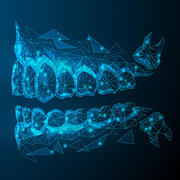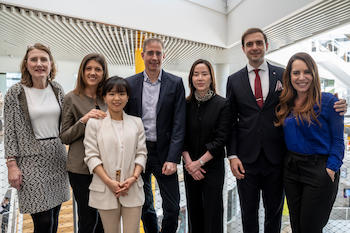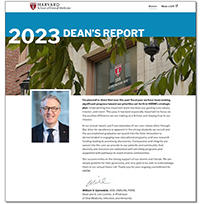
Artificial intelligence applications and tools for dentistry emerging in the marketplace today have, for the most part, been designed for use in dental practices and by dentists in the field. However, AI tools designed for learning dentistry are an area less explored.
“Dental education uses simulation-based learning for the development of student’s psychomotor skills, yet simulative approaches are not as widespread in other areas of dental education, such as diagnostics, clinical decision-making, treatment planning, and prognostication,” said Magda Feres, chair of Oral Medicine, Infection, and Immunity (OMII). “We see great potential for generative modeling to increase both the capabilities and the scalability of virtual patient systems used in dental education.”
Feres and a team of researchers at Harvard School of Dental Medicine (HSDM) recently received a Harvard Medical School (HMS) Dean’s Innovation Award to explore simulation-based learning in dental education through generative AI. The $100,000 award for the use of artificial intelligence in education, research, and administration aims to kickstart work that supports pioneering applications of AI that can enhance learning, improve health outcomes, increase productivity, and accelerate biomedical discoveries. The initial award will fund a year of research with the opportunity for renewal.
 The research team Feres leads includes collaborators Balazs Feher, a research fellow in OMII, Chia-Yu (Jennifer) Chen, director of Predoctoral Periodontology, and Sang Lee, assistant dean for Clinical Affairs. They will work with Andreas A. Werdich, a data scientist at the HMS Center for Computational Biomedicine (CCB) with expertise in computer vision and natural language processing, and Nathan Palmer, director of Data and Analytics Platforms at CCB and a senior research scientist in Biomedical Informatics at HMS. Important groundwork for the collaboration between CCB and HSDM was established by Jane Barrow, executive director of HSDM’s Initiative to Integrate Oral Health and Medicine.
The research team Feres leads includes collaborators Balazs Feher, a research fellow in OMII, Chia-Yu (Jennifer) Chen, director of Predoctoral Periodontology, and Sang Lee, assistant dean for Clinical Affairs. They will work with Andreas A. Werdich, a data scientist at the HMS Center for Computational Biomedicine (CCB) with expertise in computer vision and natural language processing, and Nathan Palmer, director of Data and Analytics Platforms at CCB and a senior research scientist in Biomedical Informatics at HMS. Important groundwork for the collaboration between CCB and HSDM was established by Jane Barrow, executive director of HSDM’s Initiative to Integrate Oral Health and Medicine.
The team will use deidentified patient data from the Harvard Dental Center’s (HDC) electronic dental records to engineer and fine tune a large language model (LLM) to create synthetic patient cases with dental records, clinical parameters, and imaging data that can be used for teaching.
“Using the virtual patient framework, dental students would be able to interact with an unlimited supply of simulated patient cases — complete with rich patient histories, symptoms, and imaging — to improve their diagnostic, treatment planning, and clinical decision-making skills in an immersive learning environment,” Feher said. “Based on their interactions, they would receive immediate, tailored feedback from their interactions with the virtual patient framework. This aligns with contemporary trends in medical education, emphasizing experiential learning, the integration of novel technologies, and approaches that prioritize student engagement.”
The project was launched on March 1, and the team hopes to begin testing the preliminary framework with an initial group of students by the end of the year.
“We are very fortunate to have received this funding to explore the innovative use of AI in dental education, said Feres. “It's stimulating to work with and for the students, as they will be the next generation of dentists who will be working with AI in the field. We are also very excited about this fruitful collaboration with our colleagues from HMS-CCB. This is the second project we are conducting together, and we are already planning next steps potentially applying AI to enhance personalized treatment in dentistry.”


